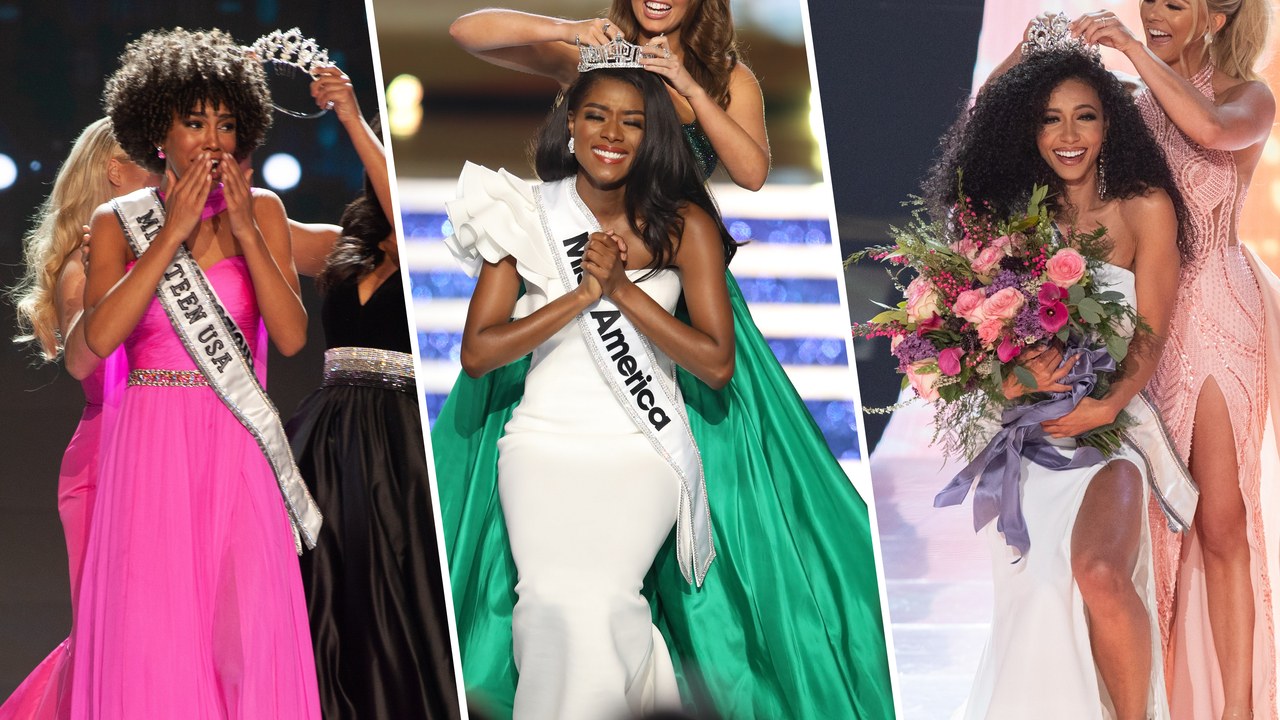Miss America, Miss Teen USA, and Miss USA Are All Black Women for the First Time Ever

For the 14 years I spent competing in pageants, the preparation leading up to a competition weekend was always the same: Go to the hairdresser to get my sewn-in weave uninstalled, my hairline relaxed, and then the weave sewn right back in. The routine took anywhere from six to eight hours and cost hundreds of dollars.
After, I would fret with my mom and aunt about how limited I was with the hairstyles I could do because I had a full weave; if I could just wear my natural hair, this wouldn’t be so complicated. But the idea that I would walk out with my own hair for competition was ludicrous: Years of weaves, relaxers, and just simply not caring for my hair properly left it breaking and my edges thin. But more than that, what was really stopping me from embracing my natural kinks and curls was a truth over which I had no control: I had never seen a Black girl with my hair texture wear her natural hair for competition, let alone win or place with it.
There’s a rule in pageantry that most competitors and coaches know about but never speak out loud: The default beauty standard is white. Although Miss America, Miss USA, Miss Teen USA, and Miss Universe have crowned a handful non-white women, most of these women wear “pageant hair”—flowing weaves and extensions with bouncy waves and curls. As a competitor, I wasn’t one to rock the boat. Even with an “acceptable” look, I had to listen to photographers and hairstylists make backhanded comments about my hair, how difficult it was to style and blend with extensions. Pageants did help me feel empowered, but they could also make me feel dejected, especially when it came to my hair.
When a Black girl wins, comments on Instagram and message boards show the darker side of our experience. “The pageant is no longer about beauty,” one person wrote on Instagram after Kaleigh Garris—an 18-year-old who wore her natural curly hair for competition—won Miss Teen USA last week. “It’s all about political correctness.” In other words, Garris didn’t win because she deserved the crown, the user felt, but because she’s Black. I saw dozens of similar comments when Cheslie Kyrst, a 27-year-old attorney from North Carolina, won Miss USA over apparent fan favorite, Alejandra Gonzalez of New Mexico. Like Garris, Kyrst is Black and wore her natural hair. (The current Miss America, Nia Franklin, is also a Black woman, marking the first time all three title-holders are Black, but chose to wear a more traditional pageant look for competition.) When you’re a Black woman in pageants—or just a Black woman who succeeds, period—the dominant culture will do its best to communicate to you that your win was not earned, but handed to you to fulfill a quota. Your achievements are not your own; they’re a box for someone else to check.
Former Miss USA Deshauna Barber, who won in 2016, has spoken about the racism she faced during her reign and her decision to wear her 4c hair for her final walk. She’s also addressed how hard it can be to push an institution like this one into the future when pockets of it seem stuck determinedly in the past. “When you’re crowned with a look, then that’s the look you’re expected to maintain. A lot of people in the pageant world are still very old school. They believe in a traditional look, a traditional Miss USA. [The organization] is trying to, in my opinion, open up that world,” Barber wrote in an essay for Refinery29 in 2017. “So, when I said I wanted to wear my natural hair, they were jumping for joy. I appreciate them for that—[but] I didn’t want to stretch it too much. I wanted to take baby steps. If I take a small one by showing my natural 4c hair, the next girl will take one, and then we’ll ease our natural hairstyles into the pageant community.”





